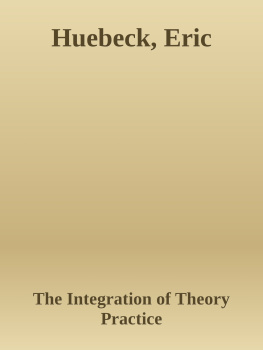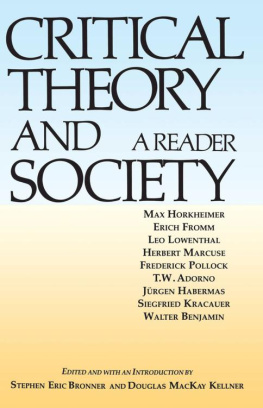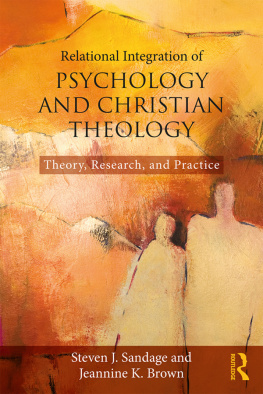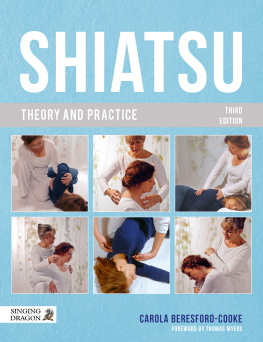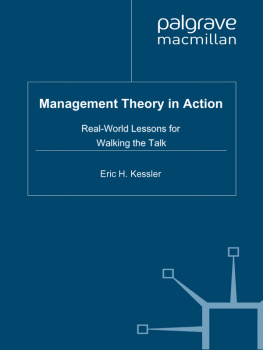Eric Huebeck - The Integration of Theory & Practice
Here you can read online Eric Huebeck - The Integration of Theory & Practice full text of the book (entire story) in english for free. Download pdf and epub, get meaning, cover and reviews about this ebook. year: 0, genre: Science / Politics. Description of the work, (preface) as well as reviews are available. Best literature library LitArk.com created for fans of good reading and offers a wide selection of genres:
Romance novel
Science fiction
Adventure
Detective
Science
History
Home and family
Prose
Art
Politics
Computer
Non-fiction
Religion
Business
Children
Humor
Choose a favorite category and find really read worthwhile books. Enjoy immersion in the world of imagination, feel the emotions of the characters or learn something new for yourself, make an fascinating discovery.
- Book:The Integration of Theory & Practice
- Author:
- Genre:
- Year:0
- Rating:4 / 5
- Favourites:Add to favourites
- Your mark:
- 80
- 1
- 2
- 3
- 4
- 5
The Integration of Theory & Practice: summary, description and annotation
We offer to read an annotation, description, summary or preface (depends on what the author of the book "The Integration of Theory & Practice" wrote himself). If you haven't found the necessary information about the book — write in the comments, we will try to find it.
The Integration of Theory & Practice — read online for free the complete book (whole text) full work
Below is the text of the book, divided by pages. System saving the place of the last page read, allows you to conveniently read the book "The Integration of Theory & Practice" online for free, without having to search again every time where you left off. Put a bookmark, and you can go to the page where you finished reading at any time.
Font size:
Interval:
Bookmark:
The Integration of Theory and Practice
A Program for the New Traditionalist Movement
by Eric Heubeck
The Integration of Theory and Practice: A Program for the New Traditionalist Movement was published on the Free Congress Foundations website in 2001.
This essay does not include a theoretical justification for, or even a definition of, a traditionalist (i.e., culturally conservative) society. Other writers have already done this with far more skill and erudition than I would be able to. For the sake of this essay, I will assume that the reader is already familiar with and sympathizes with the goal of a traditionalist society at some level.
However, none of those traditionalist thinkers, or anyone influenced by traditionalist thought, has made any serious attempt to directly put his ideas into practice. The unspoken assumption seems to be that if enough time is spent improving our intellectual sophistication and honing our arguments, our ideas will win more and more converts due simply to their irresistible appeal, and by some mysterious mechanism which no one has ever chosen to explain, our society will slowly but surely learn to cherish traditionalist values.
This way of thinking must be categorically rejected.
This essay is based on the belief that the truth of an idea is not the primary reason for its acceptance. Far more important is the energy and dedication of the idea's promoters--in other words, the individuals composing a social or political movement. The cultural conservative movement in particular has paid next to no attention to the qualities of the people working in the movement, and the relation of such qualities to the achievement of our goals. At least part of the reason for our failure must be attributed to insufficient interest by traditionalists in organization, the personal development of activists, and--most importantly--action and engagement in the world. The conservative movement has suffered, in other words, from a lack of follow-through on its most meaningful ideas.
The conservative movement is defensive, defeatist, depressed, and apologetic. It lacks self-confidence, virility, energy, intensity, vigor, aggressiveness, vitality, and a firm belief in the rightness of its cause. This is because conservatives have failed to devote the proper amount of energy to developing an alternative cultural world-view opposed to the dominant leftist one. They have instead devoted much of their energy to electing sympathetic politicians and lobbying the government to pass or overturn particular laws.
There are two problems with this strategy. The first and more obvious is that it is exceedingly and progressively more difficult to exert political influence when the cultural assumptions underlying those political goals are being steadily eroded by the popular culture, if no serious attempt to retard or reverse that erosion is ever made.
Secondly, an overreliance on political change seems to reinforce the very politicization of society that conservatives often bemoan, by ratifying the notion that an individual's personal happiness is inextricably bound up in the activity (or inactivity) of government. While government is certainly intrusive and plays too large a role in our society, the government is not totalitarian. There are plenty of opportunities to make our society more culturally conservative, and our lives richer and fuller, apart from political change, but conservatives have shown very little interest in pursuing those opportunities. They have shown far more interest in expanding political freedom than in seeing that Americans make good use of the freedom they already have, and as a result, they have succeeded in neither. The lack of interest in the latter goal is curious, since freedom for its own sake has never been a conservative goal, at least in theory.
The result of this misplaced focus is a society that increasingly does not recognize culturally conservative views, and is gradually coming to despise them. The Left has long understood that nothing can be achieved politically unless and until one can capture the imagination of the people--and imaginations are seldom captured by policy wonks on C-SPAN. They understand that a governing regime must acquire moral legitimacy before it can win the consent of the people, and all governments, particularly one such as ours, require some level of consent to govern.
The relatively recent successes of New Left ideas in law and legislation have only been made possible because their proponents were able to capture the cultural institutions--e.g., the media, academia, publishing houses, advertising agencies, Hollywood--some years earlier. Conservatives have by and large surrendered all of these institutions to the Left, with any opposition being limited to assorted muffled complaints and pathetic appeals for fairness. Meanwhile, conservatives dedicate themselves to political activism all the more furiously in the hope that it can compensate for their weakness in the non-political sectors of society. This effort must be dismissed as hopeless and self-delusional.
Conservatives must honestly assess the predicament that we are in. We must understand that the American people are no longer on our side, at least not reliably so, and they will be less so as time goes on. But more worrisome still is the fact that conservatives themselves often no longer understand or support a truly culturally conservative vision of America. Being conservative has come to mean nothing more nuanced than holding the belief that every man has the inalienable right to make as much money as he possibly can. True traditionalist conservatives are now seen as oddities in the movement who must be tolerated, or even silenced in order that the movement appear credible in the eyes of the leftist guardians of good taste.
To sum up, the basic problem confronting us is that those who are familiar with the theoretical underpinnings of conservatism are not particularly interested in putting their ideas into practice, and those who are engaged in activism are not well-read and are obsessed with public policy matters. Those who think do not act, and those who act do not think. If this continues, the conservative movement will cease to exist in every way but name.
The dire predicament in which we find ourselves demands a drastic change in strategy by cultural conservatives. It is becoming increasingly clear that we must heed Paul Weyrich's call for a tactical retreat from the fields of political battle--not totally or permanently, but until such time as we can confidently proclaim that traditionalists are a force to be reckoned with in the wider society. Without this, any offensives using political means are doomed to failure. They are therefore a waste of our people's time, money, and energy, and for that reason should not even be attempted. We will never succeed in taking over political structures until we can convince the American people that we can be trusted to take them over, and to do that we must win the people over culturally--by defining how man ought to act, how he ought to perceive the world around him, and what it means to live the good life. Political arrangements can only be formed after these fundamental questions have been answered.
Once this basic belief is accepted, our next task is to develop the means by which it can be put into practice. We must, as Mr. Weyrich has suggested, develop a network of parallel cultural institutions existing side-by-side with the dominant leftist cultural institutions. The building and promotion of these institutions will require the development of a movement that will not merely reform the existing post-war conservative movement, but will in fact be forced to supersede it--if it is to succeed at all--because it will pursue a very different strategy and be premised on a very different view of its role in society.
Next pageFont size:
Interval:
Bookmark:
Similar books «The Integration of Theory & Practice»
Look at similar books to The Integration of Theory & Practice. We have selected literature similar in name and meaning in the hope of providing readers with more options to find new, interesting, not yet read works.
Discussion, reviews of the book The Integration of Theory & Practice and just readers' own opinions. Leave your comments, write what you think about the work, its meaning or the main characters. Specify what exactly you liked and what you didn't like, and why you think so.

